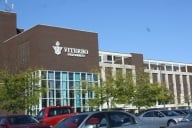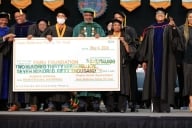You have /5 articles left.
Sign up for a free account or log in.
JPMorgan Chase plans to give $17 million to start a doctoral program at the University of Delaware, an effort that may raise new questions about collaborations between colleges and donors.
As part of the plan, JPMorgan will renovate a building to house the program, put up money to pay program faculty and pay a full ride for students seeking a degree, according to an internal university plan. In addition, JPMorgan employees may sit on dissertation committees and advise the university on which faculty members should teach in the program, according to the planning document and a top university official.
Some faculty critics warn that the degree, which has not yet been approved, could damage Delaware's credibility, and one faculty leader has dubbed the proposed degree the "JPMorgan Ph.D."
The doctorate would be be in "financial services analytics," which relies on "big data." Bruce Weber, the dean of Delaware's business school, said working closely with industry will help academics prepare students for the real world, something some business school deans feel is not happening enough.
“I think it’s a great way for business schools to really enhance the education they provide to their students by reaching out to the industry,” he said.
JPMorgan, which has a strong presence in Delaware, and the university have been working closely together since 2009. Weber, who joined the university three years ago, said officials had by then realized university programs weren't hitting the mark in terms of what employers wanted. So, JPMorgan helped the university create and pay for its Institute for Financial Analytics and Delaware created a minor in global enterprise technology. Now, JPMorgan has a fully staffed and functioning office -- using student interns -- on the first floor of the university's Purnell Hall.
But the expansion of that effort to a Ph.D. program may be too much for some faculty.
"When you give them their own JP Morgan Ph.D., that’s sort of where I got ruffled,” said Sheldon Pollack, a past faculty senate president and professor of law and political science.
He said the proposed bank-backed Ph.D. is "a non-academic Ph.D. program that doesn't belong at a quality academic institution." The Ph.D. program still needs approval by the faculty. He predicted that would be an uphill battle.
“No faculty member woke up one day and said, 'Hey, let’s set up a degree program in financial services so we can train people to work at JPMorgan,' ” Pollack said.
He also worried the university's close ties with one bank could hurt its relationship with other potential employers, a concern that he said faculty have already expressed about Delaware's existing work with JP Morgan. “Other people thought, well, it just puts other banks at a disadvantage -- you wouldn’t be able to send students to Goldman Sachs,” Pollack said.
JPMorgan declined to make a public comment for this story.
The idea for the program clearly emerged out of discussions between high-level administrators at Delaware and unnamed JPMorgan officials, according to the internal document, an application for program approval. Weber said a faculty committee has worked on the curriculum.
But the officials in the early planning meetings with JPMorgan and "others" in summer 2012 were Patrick Harker, the university's president, the head of the newly created financial analytics institute, Weber, the dean and deputy dean of the college of engineering, the senior director for university development and an associate director of corporate outreach.
Then a committee chaired by Professor Bington Chen, who leads the bank-backed institute on campus, began meeting in February to create a detailed plan for the Ph.D. program.
That plan anticipates heavy involvement by JPMorgan in paying for the program. At least 40 percent of the budget for the program would come from JPMorgan, which is set to become the largest single corporate contributor to the University of Delaware in its history (although the chemical company DuPont and the DuPont family may have together given more in inflation-adjusted dollars over the years, according to a university spokeswoman).
The university, which has already signed an agreement with JPMorgan, expects the bank will spend $2.5 million to renovate Purnell Hall to house the program and $14.1 million for other Ph.D. program expenses over the next decade.
The planning document and Weber suggest the bank could also provide advice.
For instance, the five faculty charged with supervising the program will be "JPMorgan Chase fellows." Weber said as part of that deal, the company can also advise the university on who those faculty should be.
“They can provide us with that advice or input," he said. "We welcome them to consult with us on these inputs, but it’s a university choice."
The company will also pay full freight for the initial eight students admitted to the Ph.D. program, which is expected to begin in fall 2014. Weber said the university will decide who is admitted and that he doubts many current JP Morgan employees will try to enroll. For one thing, he said, it would be hard for a bank employee to also be a full-time student.
The planning document for the degree program also anticipates JPMorgan employees will be part of at least some dissertation committees, which decide which students received their degree.
Weber said there is nothing new about this: When he was at the University of Pennsylvania's Wharton School, an official from the New York Stock Exchange sat on his dissertation committee, he said. Likewise, DuPont, which has strong ties to the state of Delaware, has long had seats on dissertation committees. It is indeed common at some universities for non-academics to serve as members of dissertation committees, but this is typically done on a case-by-case basis when such a person has particular expertise to bring to a committee, without an expectation that officials from any particular company would be called upon generally.
The plan comes as more colleges rely on donors to make up for declines in state support to colleges. (Delaware is a quasi-public.) Donors who want to take an active role in the use of their money now "have the universities a little over the barrel," said Nicholas Burbules, a professor of education policy at the University of Illinois at Urbana-Champaign who has fought a donor control effort on his campus.
“The danger is that it becomes harder and harder to walk away from the table and the strings that people feel entitled to attach to their donations – they’re going from strings to ropes to chains,” Burbules said.
Weber said drawing lines is a challenge, but the balancing act is nothing new.
“It’s a challenge to the university to be really aware of where they need to control their academic activities and programs but also be collaborative with external organizations to be able to do things we wouldn’t able to do with our own internal resources,” Weber said.
A university spokeswoman emphasized JPMorgan will have an advisory role, but not a decision-making role.








